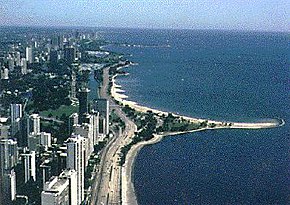
Cuspate forelands, also known as cuspate barriers or nesses in Britain, are geographical features found on coastlines and lakeshores that are created primarily by longshore drift.[1] Formed by accretion and progradation of sand and shingle, they extend outwards from the shoreline in a triangular shape.[1]
Some cuspate forelands may be stabilised by vegetation, while others may migrate down the shoreline. Because some cuspate forelands provide an important habitat for flora and fauna, effective management is required to reduce the impacts from both human activities and physical factors such as climate change and sea level rise.